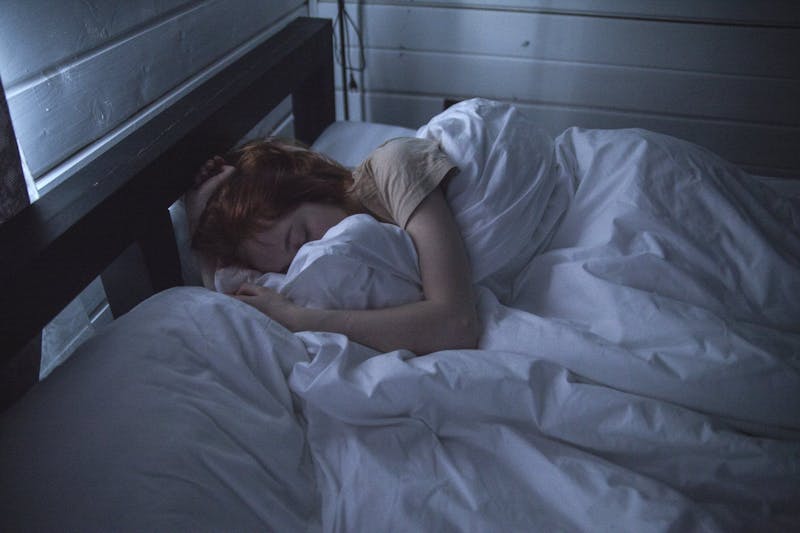
Sleep apnea and glaucoma are two conditions that can have a serious impact on a person's health.
While the two conditions may seem unrelated, there may be a link between the two.
Let's take a closer look at the relationship between sleep apnea and glaucoma and how the two conditions may be connected.
We will also discuss how understanding this link can help improve the diagnosis and treatment of both conditions.
What Is Sleep Apnea?
Sleep apnea is a disorder characterized by pauses in breathing during sleep. This can be caused by an obstruction of the upper airway, resulting in decreased oxygen levels in the blood and increased sleep disturbances. Common symptoms include loud snoring, feeling tired after a night's sleep, and waking up with a dry mouth. Sleep apnea affects both men and women, but it is more common in people who are overweight, have large necks, or have a family history of the disorder. Treatments range from lifestyle changes to surgical interventions, depending on the severity of the condition.
What Is Glaucoma?
Glaucoma is an eye condition that affects millions of people all over the world. It is caused by an increase in pressure in the eye, which can lead to damage to the optic nerve. This can cause vision loss, or even blindness in severe cases. Glaucoma is often referred to as a "silent thief" because it can progress without any symptoms. Early diagnosis and treatment is essential for preserving vision.
There are two primary types of glaucoma: open-angle and angle-closure. Open-angle glaucoma is the most common form, and it is caused by an obstruction in the drainage angle of the eye. The pressure builds up over time, leading to vision loss. Angle-closure glaucoma occurs when the drainage angle becomes too narrow or blocked off, which causes a sudden rise in eye pressure. This can lead to permanent vision loss if not treated promptly.
The most common treatments for glaucoma involve medications, such as eye drops and pills, laser surgery, and traditional surgery. The type of treatment chosen will depend on the severity of the case and other factors. It is important to work closely with your ophthalmologist to determine the best course of action.
How Are Sleep Apnea and Glaucoma Related?
Sleep apnea and glaucoma are both conditions that can have serious effects on your health. Studies have found that there may be a link between the two conditions, suggesting that people with sleep apnea may be more likely to develop glaucoma.
While more research is needed to definitively make the connection between the two, current research shows that a lack of oxygen to the brain caused by sleep apnea may lead to additional damage of the optic nerve. With pauses of breathing during sleep, your body and brain can become deprived of oxygen for a period of time.
Both sleep apnea and glaucoma can be treated with lifestyle changes, medications, and/or surgery. For people with sleep apnea, lifestyle changes such as losing weight, quitting smoking, and avoiding alcohol can help reduce the severity of symptoms. In addition, the use of a continuous positive airway pressure (CPAP) machine can help keep airways open during sleep. For people with glaucoma, prescription eye drops can be used to lower pressure within the eye, while surgery may be necessary in more severe cases.
If you are suffering from either sleep apnea or glaucoma, reach out the Coastal Eye Surgeons about the potential connection between the two conditions. Treatment options for both conditions can help reduce your symptoms and prevent further complications.
Signs to watch out for:
Sleep apnea can be difficult to diagnose, but there are some signs to be aware of that may indicate you are suffering from the disorder. If you or a loved one experience any of the following symptoms, it is important to speak with a healthcare professional right away:
· Loud and persistent snoring
· Gasping for air during sleep
· Frequent awakenings during the night
· Waking up with a dry mouth or sore throat
· Daytime sleepiness and fatigue
Glaucoma is an eye disease that can cause irreversible vision loss if left untreated. Early diagnosis is key, as there is no cure for glaucoma. However, if caught early, treatment can help prevent vision loss. Look out for the following symptoms:
· Blurred vision in one or both eyes
· Halos around lights
· Eye pain or pressure
· Headaches or nausea
· Seeing spots or flashes of light
Contact Coastal Eye Surgeons For More Information On Sleep Apnea & Glaucoma Related Symptoms:
If you or a loved one are experiencing any of these symptoms, speak with Dr. Shakir from Coastal Eye Surgeons about it as well as any connection between the two. It's best to get these conditions under control early before they get any worse.

